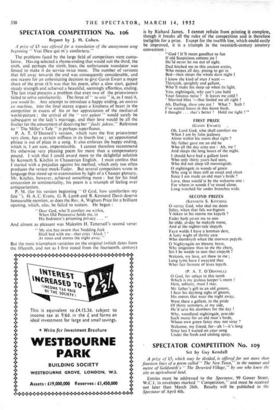SPECTATOR COMPETITION No. 106
Report by J. M. Cohen.
A prize of £5 was offered for a translation of the anonymous song beginning " Vrai Dieu qui m'y confortera."
The problems faced by the large field of competitors were cumu- lative. Having selected a rhyme-ending that would suit the third, the sixth, and perhaps the ninth, lines, the unfortunate translator was forced to make it do service twice more. The number of versions that fell away towards the end was consequently considerable, and one reason for an unhesitating decision to give Gavin Ewart a major share of the prize (£3) was that his poem, after a slow start, gained steady strength and achieved a beautiful, seemingly effortless, ending. The last triad presents a problem that even two of the prizewinners failed to solve satisfactorily. The force of " ru sois " is, as I read it, you would be. Any attempt to introduce a happy ending, an amicus ex machina, into the final stanza argues a kindness of heart in the competitor in excess of his or her appreciation of the mediaeval world-picture ; the arrival of the " vent galant " would surely be subsequent to the lady's marriage, and their love would be all the livelier for the amusement of deceiving her "faulx jaleux." Reference to " The Miller's Tale " is perhaps superfluous.
P. A. T. O'Donnell's version, which runs the first prizewinner very close, has a certain stiffness in its fourth line ; an appositional phrase is out of place in a song. It also enforces the happy ending, which is, I am sure, impermissible. I cannot therefore recommend his otherwise very pleasing poem for more than a compensatory pound. I wish that I could award more to the delightful solution by Kenneth S. Kitchin in Chaucerian English. I must confess that 1 started with a prejudice against his method, which only too often produces the veriest mock-Tudor. But several competitors wrote in language-that stood up to examination by light of a Chaucer glossary. Mr. Kitchin, however, achieved something more ; but for his final concession to sentimentality, his poem is a triumph of feeling over antiquarianism.
P. M. (for his version beginning " 0 God, how comfortless my fate "), H. A. C. Evans, G. R. Lamb and R. Kennard Davis deserve honourable mention, as does the Rev. A. Wigham Price for a brilliant opening, which, alas, he failed to sustain. He began : "Dear God, who'll comfort me within, When Old Possessive holds me, in His bedroom's prisoning privacy ... "
And almost as pleasant was Malcolm H. Tattersall's second verse: " My sire has sworn that Nodding Jack
Shall bed with me—that cries 'Alack ! '
At noon and snores the night away."
But the most triumphant variation on the original (which dates from the fifteenth, and not as I first stated from the fourteenth, century) is by Richard James. I cannot refrain froni printing it complete, though it breaks all the rules of the competition and is therefore ineligible for a prize. Except for the twelfth line, which could easily be improved, it is a triumph in the twentieth-century amatory convention :
- "God ! It'll mean goodbye to fun If old Suspicious cottons on !
Held never let me out of sight.
Dad hitched me to this ancient cretin,
Who mopes all day, pining to get in
Bed—then sleeps the whole darn night I know the kind of man I want — Thirtyish, sprightly and gallant, Who'll make his sleep up when its light.
You, nightingale, why can't you hold
Your fatuous noise ? It leaves me cold !
Married bliss '—that fooled me all right !
Ah, Darling, there you are ! What ? Sssh !
I've waited hours in this damn bush.
I thought . . that's better ! Hold me tight ! "
FIRST PRIZE
(GAVIN EWART)
Oh, Lord God, who shall comfort me When I am by false jealousy Alone within his room shut tight ?
My father gave me an old he Who all the day cries out : Ah, me ! And sleeps the long hours of the night.
I should have had a gallant keen Who only thirty years had seen, Who did not sleep till morningtide.
O nightingale in woods of green
Why sing'st thou still so sweet and clean Since I am made an old man's bride ? Love, thou would'st be the welcome one : For whom in woods I've stood alone-, Long watched for under branches wide.
SECOND PRIZES
(KENNETH S. KITCHIN)
O verray God, who shal me doon Solas, whan that fats wo-bigoon Y-loken in his roome me kepyth ?
Fader hath yeven me to oon So olde, al-day he makyth mone, And al the nighter-tale slepyth.
Fayn wolde I have a lemman dere, A lusty wight of thritty yere Who slombryth whan the morwen pepyth.
O Nightyngale on blosmy brere, Why singestow thus to me thy chere, Sin I be wedde to oon that crepyth ?
Welcom, my love, art thow to me ; Long tyme have I awayted thee W'her fair forreste of leves lepyth.
(P. A. T. O'DONNELL)
O God, for solace in this tomb i
Which is my jealous keeper's room ! Here, solitary, must I stay.
My father's gift to an old groom, I hear his daylong sighs of gloom, His snores that wear the night away. Were there a gallant, in the pride Of thirty summers, at my side, He'd save his slumbers for the day ! Why, woodland nightingale, provide Such music for an old man's bride, Whose own green fancy may not stray ? Welcome, my friend, for—ah !—it's long Since last I waited on your song Under the fresh and smiling spray.










































 Previous page
Previous page